| Listing 1 - 10 of 10 |
Sort by
|
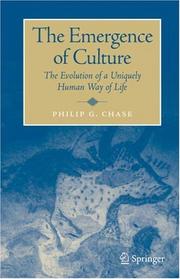
ISBN: 0387305122 9780387305127 9786610623990 1280623993 0387306749 Year: 2006 Publisher: New York : Springer,
Abstract | Keywords | Export | Availability | Bookmark
 Loading...
Loading...Choose an application
- Reference Manager
- EndNote
- RefWorks (Direct export to RefWorks)
Paleolithic archaeologists and human paleontologists have failed to address the origins of a phenomenon that is both absolutely central to the human way of life and unique to our species. In all species of mammals, there are codes (rules, concepts, values, etc.) that govern behavior. Among humans, and only among humans, some of these codes are created socially, through interactions among individuals. Other species may learn codes socially, from their parents or other members of their species, but the codes are not created socially. Human culture is thus an emergent phenomenon, one that cannot be understood without taking into account the interactions among individuals. Because human society creates the culture that governs individual behavior, it can control individual members in a way that other primate societies cannot. Culture can facilitate cooperative and group activities, but can also lead individuals to behave contrary to their own evolutionary best interests. This book describes the emergent nature of human culture. It proposes hypotheses to explain how a phenomenon that is potentially maladaptive for individuals could have evolved, and to explain why culture plays such a pervasive role in human life. It then reviews the primatological, fossil, and archaeological data to test these hypotheses.
Culture --- Social evolution --- Cultural evolution --- Cultural transformation --- Culture, Evolution of --- Evolution --- Social change --- Origin of culture --- Civilization --- Origin --- History --- Social evolution. --- Origin.
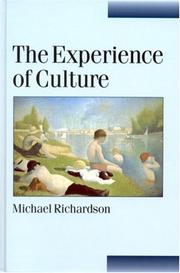
ISBN: 0761966501 9780761966500 9781412933278 1412933277 9781446219874 1446219879 1280370165 9781280370168 9786610370160 6610370168 Year: 2001 Publisher: London : SAGE,
Abstract | Keywords | Export | Availability | Bookmark
 Loading...
Loading...Choose an application
- Reference Manager
- EndNote
- RefWorks (Direct export to RefWorks)
In an innovative study of culture, Michael Richardson suggests new ways of examining the subject which focus on how cultures emerge and how they are experienced by humans, rather than why cultures emerge.
Philosophy and psychology of culture --- Ethnology. Cultural anthropology --- Culture --- -#SBIB:316.7C120 --- Cultural sociology --- Sociology of culture --- Civilization --- Philosophy --- Cultuursociologie: algemene en theoretische werken --- Social aspects --- Philosophy. --- Philosophie --- #SBIB:316.7C120 --- Social evolution. --- Acculturation. --- Origin. --- Culture contact --- Development education --- Ethnology --- Assimilation (Sociology) --- Cultural fusion --- Cultural evolution --- Cultural transformation --- Culture, Evolution of --- Evolution --- Social change --- Origin of culture --- History --- Culture contact (Acculturation)


ISBN: 0199883122 128056055X 9786610560554 0195347447 1423756851 1433700581 9781423756859 0195165241 9780195165241 019518145X 9780195181456 9781280560552 6610560552 9780195347449 9781433700583 9780199883127 0197731155 Year: 2005 Publisher: Oxford New York Oxford University Press
Abstract | Keywords | Export | Availability | Bookmark
 Loading...
Loading...Choose an application
- Reference Manager
- EndNote
- RefWorks (Direct export to RefWorks)
This text presents, in one convenient and coherently organized volume, 20 influential but until now relatively inaccessible articles that form the backbone of Boyd and and Richerson's path-breaking work on evolution and culture.
Social evolution. --- Culture --- Human evolution. --- Sociobiology. --- Biologism --- Human biology --- Human evolution --- Psychology, Comparative --- Social evolution --- Evolution (Biology) --- Physical anthropology --- Evolutionary psychology --- Human beings --- Origin of culture --- Civilization --- Cultural evolution --- Cultural transformation --- Culture, Evolution of --- Evolution --- Social change --- Origin. --- Social aspects --- Origin --- History
Book
ISBN: 9004252002 9789004252004 9789004251687 9004251685 Year: 2013 Publisher: Leiden : Brill,
Abstract | Keywords | Export | Availability | Bookmark
 Loading...
Loading...Choose an application
- Reference Manager
- EndNote
- RefWorks (Direct export to RefWorks)
Origins and Futures: Time Inflected and Reflected provokes an interdisciplinary dialogue about culture, politics, and science’s strategies to divert the relentless trajectory of time. Literature, socio-political policy, physics, among other subjects, demonstrate the human refusal to enlist in temporal determinism. Articles ranging from how detective fiction and international terrorism manipulate the narration of events, to the unlocking of political trauma through forgiveness, to the genetic archaeology of the Human Genome project and the lacunar amnesia of nuclear energy corporations, all argue that wherever human minds meet they wrestle to undo the irrevocable, the irreversible, the fixed. Although such efforts look to the future, they rarely look straight ahead. Whatever their enterprise, writers, philosophers, and scientists believe that origins are alacritous keys to future hopes and aspirations. Contributors include: Marcus Bullock, Michael Crawford, Patricia Engle, Carol Fischer, J. T. Fraser, Sabine Gross, Paul Harris, Rosemary Huisman, Karmen MacKendrick, Steven Ostovich, Walter Schweidler, Friedel Weinert, and Masae Yuasa.
Time --- Culture --- Life --- Future, The. --- Time in literature. --- SOCIAL SCIENCE / Human Geography --- Origin of culture --- Civilization --- Abiogenesis --- Biogenesis --- Germ theory --- Heterogenesis --- Life, Origin of --- Life (Biology) --- Origin of life --- Plasmogeny --- Plasmogony --- Evolution (Biology) --- Exobiology --- Spontaneous generation --- Social aspects. --- History. --- Philosophy. --- Origin. --- History --- Origin
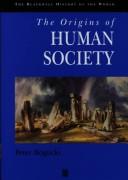
ISBN: 1557863490 1577181123 9781577181125 9781557863492 Year: 1999 Volume: *4 Publisher: Malden: Blackwell,
Abstract | Keywords | Export | Availability | Bookmark
 Loading...
Loading...Choose an application
- Reference Manager
- EndNote
- RefWorks (Direct export to RefWorks)
Cultural evolution --- Cultural transformation --- Culture [Evolution of ] --- Evolutie [Sociale ] --- Evolution sociale --- Primitieve maatschappij --- Primitieve maatschappijen --- Primitive societies --- Primitive society --- Social evolution --- Sociale evolutie --- Sociétés primitives --- Culture --- Origin --- #SBIB:39A3 --- -Social evolution --- Culture, Evolution of --- Evolution --- Social change --- Cultural sociology --- Sociology of culture --- Civilization --- Antropologie: geschiedenis, theorie, wetenschap (incl. grondleggers van de antropologie als wetenschap) --- Social aspects --- World history --- Prehistory --- Man, Primitive --- Society, Primitive --- Origin of culture --- History --- Culture - Origin
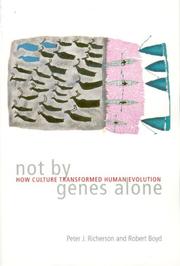
ISBN: 9780226712123 9780226712840 0226712125 0226712842 Year: 2005 Publisher: Chicago, Ill.: University of Chicago press,
Abstract | Keywords | Export | Availability | Bookmark
 Loading...
Loading...Choose an application
- Reference Manager
- EndNote
- RefWorks (Direct export to RefWorks)
Éthologie humaine --- Sociobiology. --- Social evolution --- Culture --- Human evolution --- Human behavior --- 3339 --- Origin --- Philosophy of science --- Human ecology. Social biology --- --Sociobiology. --- Sociobiology --- Biologism --- Human biology --- Psychology, Comparative --- Action, Human --- Behavior, Human --- Ethology --- Human action --- Human beings --- Physical anthropology --- Psychology --- Social sciences --- Evolution (Biology) --- Evolutionary psychology --- Origin of culture --- Civilization --- Cultural evolution --- Cultural transformation --- Culture, Evolution of --- Evolution --- Social change --- Social aspects --- Behavior --- History --- Human behavior. --- Human evolution. --- Social evolution. --- Origin. --- Evolution sociale --- Homme --- Comportement humain --- Sociobiologie --- Origines --- Culture - Origin --- Évolution
Book
ISBN: 1009257331 100925734X 1009257374 1009257358 Year: 2022 Publisher: Cambridge : Cambridge University Press,
Abstract | Keywords | Export | Availability | Bookmark
 Loading...
Loading...Choose an application
- Reference Manager
- EndNote
- RefWorks (Direct export to RefWorks)
This Element follows the development of humans in constantly changing climates and environments from Homo erectus 1.9 million years ago, to fully modern humans who moved out of Africa to Europe and Asia 70,000 years ago. Biosemiotics reveals meaningful communication among coevolving members of the intricately connected life forms on this dynamic planet. Within this web hominins developed culture from bipedalism and meat-eating to the use of fire, stone tools, and clothing, allowing wide migrations and adaptations. Archaeology and ancient DNA analysis show how fully modern humans overlapped with Neanderthals and Denisovans before emerging as the sole survivors of the genus Homo 35,000 years ago. Their visions of the world appear in magnificent cave paintings and bone sculptures of animals, then more recently in written narratives like the Gilgamesh epic and Euripides' Bacchae whose images still haunt us with anxieties about human efforts to control the natural world.
Human evolution. --- Culture --- Climatic changes. --- History. --- Origin. --- Annals --- Auxiliary sciences of history --- Changes, Climatic --- Changes in climate --- Climate change --- Climate change science --- Climate changes --- Climate variations --- Climatic change --- Climatic changes --- Climatic fluctuations --- Climatic variations --- Global climate changes --- Global climatic changes --- Climatology --- Climate change mitigation --- Global environmental change --- Teleconnections (Climatology) --- Origin of culture --- Civilization --- Evolution (Biology) --- Physical anthropology --- Evolutionary psychology --- Human beings --- Environmental aspects --- History --- Origin
Multi
ISBN: 9780521769013 0521769019 9780521189712 0521189713 9780511779978 9780511789434 0511789432 0511779976 1282725009 9781282725003 1107209358 9781107209350 9786612725005 6612725001 0511788703 9780511788703 0511786832 9780511786839 0511785690 9780511785696 0511787979 9780511787973 Year: 2011 Publisher: Cambridge Cambridge University Press
Abstract | Keywords | Export | Availability | Bookmark
 Loading...
Loading...Choose an application
- Reference Manager
- EndNote
- RefWorks (Direct export to RefWorks)
In this book, Kate Distin proposes a theory of cultural evolution and shows how it can help us to understand the origin and development of human culture. Distin introduces the concept that humans share information not only in natural languages, which are spoken or signed, but also in artefactual languages like writing and musical notation, which use media that are made by humans. Languages enable humans to receive and transmit variations in cultural information and resources. In this way, they provide the mechanism for cultural evolution. The human capacity for metarepresentation - thinking about how we think - accelerates cultural evolution, because it frees cultural information from the conceptual limitations of each individual language. Distin shows how the concept of cultural evolution outlined in this book can help us to understand the complexity and diversity of human culture, relating her theory to a range of subjects including economics, linguistics, and developmental biology.
Linguistics --- Philosophy of nature --- Human beings --- Human evolution. --- Language and languages --- Social evolution. --- Origin. --- Antiquity of human beings --- Origin of human beings --- Human evolution --- Origin of languages --- Speech --- Cultural evolution --- Cultural transformation --- Culture, Evolution of --- Culture --- Evolution --- Social change --- Evolution (Biology) --- Physical anthropology --- Evolutionary psychology --- Origin --- Communication. --- Material culture. --- Social interaction. --- Origin of culture --- Civilization --- Human interaction --- Interaction, Social --- Symbolic interaction --- Exchange theory (Sociology) --- Psychology --- Social psychology --- Folklore --- Technology --- Communication, Primitive --- Mass communication --- Sociology --- History --- humanities --- evolution --- language [general communication] --- Arts and Humanities --- Philosophy --- cultuurfilosofie
Periodical
ISSN: 21794960 1984249X Year: 2008 Publisher: Brasília, DF : Cátedra Unesco Archai,
Abstract | Keywords | Export | Availability | Bookmark
 Loading...
Loading...Choose an application
- Reference Manager
- EndNote
- RefWorks (Direct export to RefWorks)
Civilization, Western --- Civilization, Classical --- Culture --- Civilization. --- Civilization, Classical. --- Civilization, Western. --- Origin --- Origin. --- Greece --- Greece. --- Civilization --- Origin of culture --- Civilization, Occidental --- Occidental civilization --- Western civilization --- Classical civilization --- Civilization, Ancient --- Classicism --- Barbarism --- Civilisation --- Auxiliary sciences of history --- Cultural sociology --- Sociology of culture --- Popular culture --- Social aspects --- al-Yūnān --- Ancient Greece --- Ellada --- Ellas --- Ellēnikē Dēmokratia --- Elliniki Dimokratia --- Grčija --- Grèce --- Grecia --- Gret͡sii͡ --- Griechenland --- Hellada --- Hellas --- Hellenic Republic --- Hellēnikē Dēmokratia --- Kingdom of Greece --- République hellénique --- Royaume de Grèce --- Vasileion tēs Hellados --- Xila --- Yaṿan --- Yūnān --- Gret︠s︡ii︠a︡ --- Ελληνική Δημοκρατία --- Ελλάς --- Ελλάδα --- Греция --- اليونان --- يونان --- 希腊 --- ancient philosophy --- classics
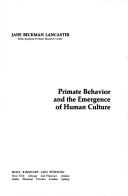
ISBN: 003091311X 9780030913112 Year: 1975 Publisher: New York (N.Y.): Holt, Rinehart and Winston,
Abstract | Keywords | Export | Availability | Bookmark
 Loading...
Loading...Choose an application
- Reference Manager
- EndNote
- RefWorks (Direct export to RefWorks)
Social Behavior --- Psychology, Comparative --- Culture --- Biological Evolution --- Primates --- Human evolution --- Social behavior in animals --- Behavior --- Origin --- Culture. --- Biological Evolution. --- Primates. --- Psychology, Comparative. --- Social Behavior. --- Harassment, Non-Sexual --- Non-Sexual Harassment --- Nonsexual Harassment --- Harassment, Nonsexual --- Behavior, Social --- Behaviors, Social --- Harassment, Non Sexual --- Harassments, Non-Sexual --- Harassments, Nonsexual --- Non Sexual Harassment --- Non-Sexual Harassments --- Nonsexual Harassments --- Social Behaviors --- Comparative Psychology --- Comparative Psychologies --- Psychologies, Comparative --- Primate --- Evolution, Biological --- Sociobiology --- Beliefs --- Cultural Background --- Customs --- Background, Cultural --- Backgrounds, Cultural --- Belief --- Cultural Backgrounds --- Cultures --- Custom --- Human evolution. --- Social behavior in animals. --- Origin. --- Behavior. --- Animal behavior --- Animal societies --- Behavior, Comparative --- Comparative behavior --- Comparative psychology --- Ethology, Comparative --- Intelligence of animals --- Zoology --- Animal intelligence --- Animal psychology --- Human behavior --- Instinct --- Evolution (Biology) --- Physical anthropology --- Evolutionary psychology --- Human beings --- Origin of culture --- Civilization --- History --- Cultural Relativism --- Cultural Relativisms --- Relativism, Cultural --- Relativisms, Cultural --- Sociality --- Primates - Behavior --- Culture - Origin
| Listing 1 - 10 of 10 |
Sort by
|

 Search
Search Feedback
Feedback About UniCat
About UniCat  Help
Help News
News